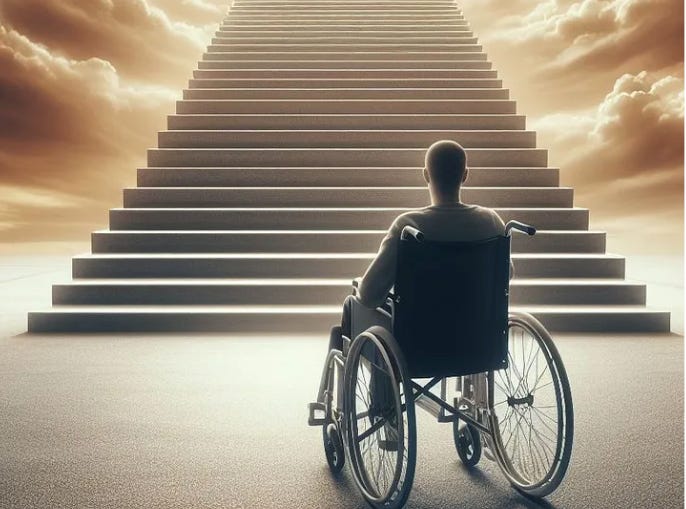Dispatch: Taylor Swift Fake AI Porn Rouses Sleepy Robo-Biden; AI Smart Glasses Boom;
As AI continues to impact and surprise, governments struggle to keep up

Hello Friends,
Sometimes things are not simple, would you agree?
This last week the AI news and developments have quite complex implications for society. On the one hand, companies are building real products and services that are having tangible impact on society. On the other hand, governments populated by older, mostly clueless leaders seem desperate to keep up with developments yet perhaps predictably seem to be failing to do so.
My hope is in having more informed citizens, like you, who would like to understand how AI could actually impact you, can develop a better understanding of not only how AI could change society, but what changes you actually want and don’t want.
This week the most interesting themes in AI news I’m seeing are:
AI fake voices & images: While this has been a known issue for a number of years, the media continues to be shocked at recent examples of fake voices and images of high profile people. Many elections this year up the ante.
Boom in smart AI glasses: There has been a flurry of companies releasing AI smart glasses in the last few weeks, this is likely going to have a big impact on bringing AI into the real world in a more tangible way for many
Links to stories on these and more below.
Hope you have a productive week!
Best wishes,
Pranath
My latest articles
The Hidden Benefits of Treating AI Respectfully (That Most Don’t Realise)

Many people believe it doesn’t matter how we treat AI — it’s just a machine after all right? I believe this is totally wrong. Is that because I believe AI could be conscious? Not for that reason no, but because treating AI badly is going to have negative consequences for both you and humanity more generally. But how, why? In this article, I go into the reasons & evidence for why the way we treat AI really does matter for us.
AI Is’nt Replacing Math Teachers, It’s Making Them Better

There’s plenty of AI stories in the news, but is it all just hype? is it actually making an difference to people’s lives? In this article I look at how AI is helping maths teachers improve with their ongoing professional development. I look at the results of a recent peer reviewed paper that shows that not only is AI making a measurable impact on improving teaching outcomes, but also how AI can help improve teaching in a way that has not been possible before.
AI Doomers are Hurting the Disabled
One of the biggest debates in AI at the moment is between ‘AI Doomers’ and ‘AI Optimists’, between those who believe AI is a threat to humanity, and those who believe AI could help humanity. Many AI Doomers want to pause or even stop all AI development, to help keep humanity safe, they say. But could AI Doomer’s actions actually lead to more suffering? In this article I look at some of the consequences if we paused or stopped all AI development. Rather than keeping people safe, if the AI Doomers manage to stop or pause AI development, evidence suggests this could cause immense pain and suffering to millions of our most vulnerable in society.
Notable other AI news
AI fake voices & images
There have been many stories on these theme in the last week or so.
Firstly, Twitter (X) got flooded fake porn images with Taylor Swift last week.
One use of AI is it enables the creation of images that look photo-realistic, with anyone or anything doing almost anything you want.
Like any technology, such as a hammer - technology isn’t inherently good or bad itself but rather the use of it. A hammer can be used to fix a shelf, or to kill, for example.
Similarly, AI can be used to create images of fantasy unicorns, or fake porn images of Taylor swift.Predictably most of the reporting on the Taylor Swift story framing AI as a ‘fake news’ threat.
This seems to have led political leaders such as US President Joe Biden to briefly wake up and take notice of this issue as was reported that the White House being alarmed over the Taylor Swift images and has threatened action.
This was despite the fact that fake porn images created using AI have been used to harass less famous ordinary women for a number of years now with little interest from governments.
Apparently, politicians only seem to care and take notice when it happens to celebrities?
It’s not clear if Biden made the connection of this to another incident earlier in the week where he was also briefly awoken to the news that his voice was ‘cloned’ using AI and then used to create ‘fake robocalls’ to tell voters not to vote.
What makes this an even hotter topic right now is of course the many elections we have across the West this year, and the potential for how fake AI image or voice technology could be used.
However, these stories highlight three of the worst things about the responses of society currently to some of the latest AI developments.
Firstly, the media rather than being a source of balanced & accurate information about AI, mis-informs the public about AI as a a ‘threat’ rather than as technology with both positive and negative uses.
Second, politicians and legislators seem absolutely clueless about the technology, and seem to only respond in a panic to alarmist media headlines.
It has always been a challenge for politicians and leaders to keep up with technological developments.
What makes this even worse, is AI is developing much faster than any previously technology, and society appears to be choosing politicians and leaders even less able to keep up with it, due for example to being extremely old or cognitively compromised.
Thirdly, simple or panicked responses are unlikely to have good outcomes.
Simply banning AI for example is unlikely to be feasible or desirable in a free democratic society, and would look a bit odd given even China is supporting AI creative freedom better than the west currently.
Yet regulating use of AI to get the right balance between freedom and safety is not easy.
How would you do it? what should be the the right balance?
This also means as citizens, we cannot rely on the media to keep us well informed, or for our governments to be taking appropriate actions maximise the rewards and minimise risks of technology such as AI.
Our main hope, I believe, are for ordinary citizens such as you to become more informed, and for you to think more critically about what these AI developments really mean for us, and what should be the right balance between freedom and safety for using AI.
My hope is, this might also lead us to choose better political representatives who are better able to deal with the challenges our society faces, rather than less able.
Boom in smart AI glasses
Are smart glasses just the latest tech bro toy? What has this to do with society?
Quite a lot in fact, i’d suggest.
The last couple of weeks and months have seen a flurry of announcements of new gadgets.
But I think of particular interest is the development of smart glasses.
What are smart glasses? as Wareable magazine puts it:
When we talk about smart glasses, we're generally focusing on eyewear that has augmented reality technology included. This merges what you see in the real world with virtual information, and usually overlays this on one of the lenses. It could be as trivial as seeing a virtual Pickahu on your couch, or as practical as text from a menu being translated in front of your eye.
Probably the first significant development of these was Metas ray ban sunglasses, and there have been several released from other companies over the last few weeks, most recently one by Singapore startup Brilliant labs co-founded by a former Apple Exec.
But why does this matter?
It matters because this is bringing AI out of our computer screens and into the real physical world, and I think thats a significant and powerful shift, thats going to effect society in many ways both good and bad.
Let me try and illustrate this with an example.
One of the features of smart glasses I’m most excited about is live language translation. Google announced a teaser of a prototype that showed how it could live translate a conversation:
Imagine having a pair of these, and being able to travel to any country in the world, speak to anyone, and understand what they say and be understood.
So many of the barriers and conflicts between cultures can happen due to language barriers.
Our ability to understand another culture and people, is limited by language.
To be honest, once we have one of these I can’t wait to get one and travel, i’ve always felt curious about other countries and cultures.
I don’t just want to be a tourist and be limited to doing all the tourist things - I want to really get to know other people from another cultures.
Language has always been the barrier, and the key to this.
This one AI feature, which is almost here, is really going to enrich my life, my understanding of people from other cultures.
What is it going to do for everyone else? what could it do for you?
Of course, there are dangers too. For example, some of these AI smart glasses can record images and video.
While you can do this with smartphones currently, it’s more obvious you are doing it when using a smartphone. Smart glasses are far more covert and subtle, you will probably not even know if someone is recording you.
Maybe that’s going to be bad sometimes, for example for your personal privacy.
But maybe even that could be good sometimes too, for example if someone was wearing these glasses when something bad was happening, it could be a way to record evidence of wrong doing without drawing attention.
The point I’m trying to make though, is real world AI such as smart glasses is going to be a big deal for society, with potentially harmful but also good effects.
What’s your perspective on the issues raised this week?
I’d love to know what you think whatever that is, let me know in the comments and let’s continue this important discussion about how AI is impacting society.





